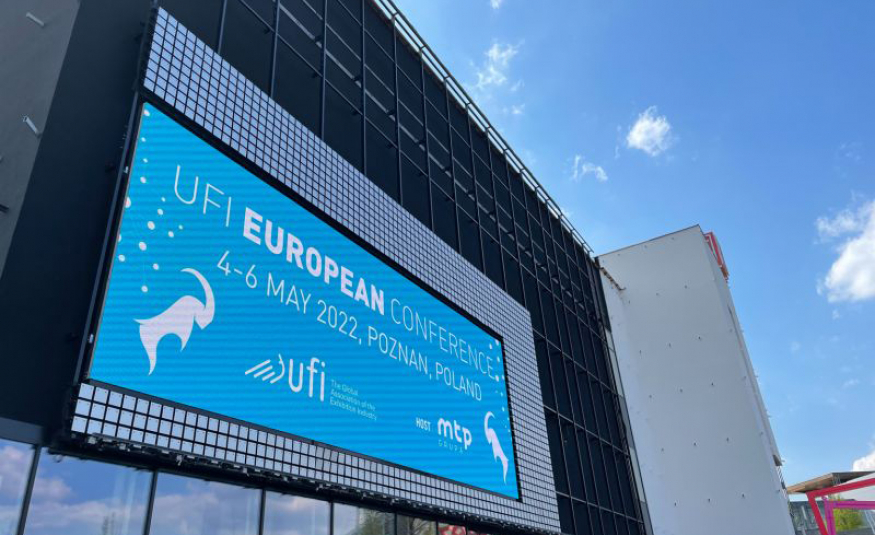Stephanie Selesnick looks back at UFI’s European reunion in Poland.
About 170 delegates met in Poznań, Poland, 4-6 May, for global association of the exhibition industry UFI’s European Conference 2022. Themes of sustainability, the value of live F2B B2B events, and regionalisation were to the fore.
The mood was upbeat in this first live edition of the European Conference since Covid-19. Live music abounded. A ukulele band and hula dancers opened the conference and a live band played between educational sessions.
MTP chairman of the Board of Directors and venue host Tomasz Kobierski welcomed delegates. While Natalia Urbanska-Guss, InSpire Foundation, shared the efforts of MTP Grupa (host venue), volunteers and companies, including Fondazione Fiera Milano and Fiera Milano SpA, who sent six trucks filled with supplies for Ukrainian refugees.
Paddy Cosgrave, CEO and founder of Web Summit, shared his thoughts on industry trends, including the rise of regional events driving attendance to a mothership event, co-ownership of data by tech providers and organisers, and role of the metaverse, AI, AR, VR and XR in future B2B events.
On data and software, Cosgrave said that some digital event platforms were trying to be like Amazon, taking over the events business and driving out organisers. Instead, they should act more like a salesforce, providing “the boring and very necessary back-end tech to help clients increase efficiencies in all areas of live events.” He called the metaverse and virtual conferences/expos a “distraction” from what large companies are doing (referring back to the Amazon analogy). AI, in his opinion, is mostly hype.
Cosgrave said the events industry should play a larger role in supporting SMEs, singling out German Messes as “hidden champions” of smaller companies. He called 365-communities “fools’ gold”, saying festivals and events worked for a reason – they are time limited, likening trying to make Easter week into Easter Year – which won’t work.
Mike Seaman, CEO of Raccoon Events, described how he had taken his passion for running and turned it into 10 events (six in the UK, four in the US), with more on the horizon. He credits part of the success to “inside out marketing” and using B2B tactics along with influencers to make the company’s B2C events successful.
Seaman suggested measuring an event’s carbon footprint first, then reducing areas creating the most carbon. This, he said, could include providing information packs with tips to exhibitors and visitors.
His biggest fear? Keeping the 30 employees from burning out as the company grows, while looking to expand in the US and Europe.
Natalia Hatalska, Infuture Institute, presented the results from the Future of Expos Study and said things were not going back to the way they were pre-Covid. Citing examples from the recent World Expo in Dubai, she said that AR/VR/XR are only as good as the tech – people will quickly abandon it as soon as there’s a malfunction. Instead, visitors crave sights, sounds, smells when engaging with a stand. She shared four scenarios going forward for planning purposes:
• The Zalpha Factor (generations of Zed and Alpha) will be more interested in social interactions over making business
at events
• Multisensory experiences in the Mirror World/Metaverse (not the Meta version), but something coming down the pipeline in the next few years
• Safe self-sufficiency around climate awareness
• Local hubs with regional and smaller shows
Other sessions included the first in-person version of the Exhibition Think Tank where delegates crowd-sourced solutions to industry problems and a session on attracting and retaining talent by David Boon, Brussels Expo and UFI European Chapter chair; Karin Krogh, Bella Center and Enrica Baccini, Fondazione Fiera Milan, who pointed out our industry must better explain and promote the value proposition of working in it to attract the next generation to our business.
Also announced were the new UFI Global Exhibitions & Events Directory and the UFI 2022 Awards finalists.





